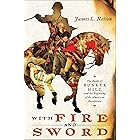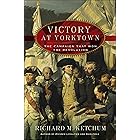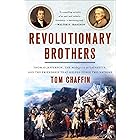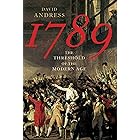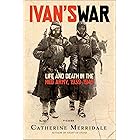Learn more
These promotions will be applied to this item:
Some promotions may be combined; others are not eligible to be combined with other offers. For details, please see the Terms & Conditions associated with these promotions.
Your Memberships & Subscriptions

Download the free Kindle app and start reading Kindle books instantly on your smartphone, tablet, or computer - no Kindle device required.
Read instantly on your browser with Kindle for Web.
Using your mobile phone camera - scan the code below and download the Kindle app.

Follow the author
OK
Unshackling America: How the War of 1812 Truly Ended the American Revolution Kindle Edition
“[A] well-researched history that shows how the War of 1812 created America’s final separation from England” (Kirkus Reviews).
“[A] lush, readable account of the war in all its complexity.” —The Wall Street Journal
Unshackling America challenges the persistent fallacy that Americans fought two separate wars of independence. Williard Sterne Randall documents an unremitting fifty-year-long struggle for economic independence from Britain overlapping two armed conflicts linked by an unacknowledged global struggle. Throughout this perilous period, the struggle was all about free trade.
Neither Jefferson nor any other Founding Father could divine that the Revolutionary Period of 1763 to 1783 had concluded only one part, the first phase of their ordeal. The Treaty of Paris of 1783 at the end of the Revolutionary War halted overt combat but had achieved only partial political autonomy from Britain. By not guaranteeing American economic independence and agency, Britain continued to deny American sovereignty.
Randall details the fifty years and persistent attempts by the British to control American trade waters, but he also shows how, despite the outrageous restrictions, the United States asserted the doctrine of neutral rights and developed the world’s second largest merchant fleet as it absorbed the French Caribbean trade. American ships carrying trade increased five-fold between 1790 and 1800, its tonnage nearly doubling again between 1800 and 1812, ultimately making the United States the world’s largest independent maritime power.
“Randall brings to life the violent skirmishes that played out in the name of trade on sea, lake, and land. . . . Helps elucidate the complex international entanglements that shaped both the revolutionary period and its aftermath.” —Publisher’s Weekly
“The interweaving of the personal, political, military and geopolitical make Unshackling America a fine portrait in incipient American nationhood. That era was plagued by political rancor, trade problems, large personalities, refugee crises, and what seemed an unwinnable war.” —MHQ: The Quarterly Journal of Military History

Explore your book, then jump right back to where you left off with Page Flip.
View high quality images that let you zoom in to take a closer look.
Enjoy features only possible in digital – start reading right away, carry your library with you, adjust the font, create shareable notes and highlights, and more.
Discover additional details about the events, people, and places in your book, with Wikipedia integration.
Customers who bought this item also bought
Editorial Reviews
Review
"[A] lush, readable account of the war in all its complexity. Admirers of Mr. Randall’s biographies will not be disappointed with the intertwined tale the author weaves in Unshackling America: The events of the war unfold in an accessible, chronological narrative, peppered with lively vignettes from the front lines of battle, the drawing rooms of Washington and Europe, and the everyday experiences of ordinary noncombatants."
―The Wall Street Journal
"Far from another study of the War of 812, Willard Randall's fast-paced narrative sweeps across the history of America from its mid-1700's status as a colonial satellite through the Revolution against the other country and the growing pains of Federalism into the second and final war with Britain...The interweaving of the personal, political, military and geopolitical make Unshackling America a fine portrait in incipient American nationhood. That era was plagued by political rancor, trade problems, large personalities, refugee crises, and what seemed an unwinnable war. Sound familiar?"
―MHQ: The Quarterly Journal of Military History
"Compelling...Randall has the storyteller's gift."
―The Historian
"The book is written in a breezy, enjoyable tone; Randall is a very good storyteller...The stories are told well and Randall clearly relishes this."
―Vermont History
"A well-researched history that shows how the War of 1812 created America's final separation from England." ―Kirkus Reviews
"Randall brings to life the violent skirmishes that played out in the name of trade on sea, lake, and land."
―Publishers Weekly
"Randall is an engaging and adept storyteller" ― Library Journal
"Those who enjoy reading history will profit from this book."― The Oklahoman
“a deeply researched, penetrating and exciting tale.” - Road to Hubbardton
"In Unshackling America, Willard Randall gives us an account of the early republic that finally makes sense of the “forgotten” War of 1812, even as it turns the conflict itself into an exciting drama. The big issues of that era--free trade, a refugee crisis, brutal party rivalries, and foreign meddling in American affairs–resonate with our own headlines. This is history as it should be written: illuminating insights grounded in gritty reality. An important book." ―Jack Kelly, author of Band of Giants and Heaven's Ditch
"After America's War of Independence ended in 1783, the British proved to be sore losers. For more than three decades, with impunity they violated American sovereignty on land and sea. Randall's Unshackling America makes a detailed, powerful, and convincing case that America did not achieve true independence during the war of 1775-1783, but only after a far longer war of fits and starts that did not end until Andrew Jackson's rout of the British at New Orleans in 1815." ―Richard Sylla, Professor Emeritus of Economics, Stern School, New York University
"In this fast paced, carefully researched and powerfully argued book, Willard Randall challenges the traditional notion that the War of 1812 was a second American Revolution. Instead, he lays out a convincing case that this war must be seen as the culmination of the American struggle for independence from Great Britain that began in 1776. A consummate stylist, Randall captures both the political tensions leading to the declaration of “Mr. Madison’s War,” and the drama of the military and naval battles that followed. This is an important book and one that both scholars and readers interested in our national past should read." ―Carol Berkin, Presidential Professor of History, Emerita, Baruch College & The Graduate Center, CUNY
About the Author
Product details
- ASIN : B01NBHC822
- Publisher : St. Martin's Press (June 27, 2017)
- Publication date : June 27, 2017
- Language : English
- File size : 15.2 MB
- Text-to-Speech : Enabled
- Screen Reader : Supported
- Enhanced typesetting : Enabled
- X-Ray : Enabled
- Word Wise : Enabled
- Print length : 465 pages
- Page numbers source ISBN : 1250111838
- Best Sellers Rank: #55,017 in Kindle Store (See Top 100 in Kindle Store)
- Customer Reviews:
About the author

After a successful seventeen-year career as a feature writer for the Philadelphia Bulletin, magazine writer for the Philadelphia Inquirer, investigative journalist for Philadelphia Magazine and stringer for Time-Life News Service, Willard Sterne Randall pursued advanced studies in history at Princeton University. Biographer of Benjamin and William Franklin, of Benedict Arnold, Thomas Jefferson, George Washington, Alexander Hamilton, and Ethan Allen, he has co-authored collections of biographies and e-books with his wife, Nancy Nahra. His most recent book is Unshackling America: How the War of 1812 Truly Ended the American Revolution, a history of the Revolutionary era. As a journalist, Randall won the National Magazine Award for Public Service from Columbia Graduate School of Journalism, the Standard Gravure Award, the Hillman Prize, the Loeb Award and the John Hancock Prize. His Benedict Arnold biography received four national awards and was a New York Times Notable Book. Publishers Weekly chose his biography of Jefferson as one of the ten best biographies of 1993. He received the Award of Merit of the American Revolution Round Table. He taught American history at John Cabot University in Rome, the University of Vermont and Champlain College, where he is Distinguished Professor of History Emeritus. He is a frequent contributor to MHQ: The Quarterly Journal of Military History, which awarded him the 2019 Thomas Fleming Prize for Outstanding Military History Writing. He lives, writes, teaches, lectures and likes to swim in Burlington, Vermont.
Customer reviews
Customer Reviews, including Product Star Ratings help customers to learn more about the product and decide whether it is the right product for them.
To calculate the overall star rating and percentage breakdown by star, we don’t use a simple average. Instead, our system considers things like how recent a review is and if the reviewer bought the item on Amazon. It also analyzed reviews to verify trustworthiness.
Learn more how customers reviews work on AmazonCustomers say
Customers find the book excellently written and well-researched, with one review describing it as an excellent history of a forgotten war. The narrative receives positive feedback, with one customer noting its great detail of every event.
AI-generated from the text of customer reviews
Select to learn more
Customers find the book readable and well-researched, with one customer noting it's an excellent history of a forgotten war.
"...well spent and my education enhanced by this scholarly, yet still readable, volume." Read more
"Excellent writing. Very interesting. Noticed an obvious error - Andrew Jackson’s plantation, The Hermitage, is in Tennessee, not South Carolina." Read more
"Very interesting, although sometimes too detailed for my taste. Well worth reading if you have any interest in the War of 1812. Filler filler" Read more
"Very readable! Good history of the War of 1812." Read more
Customers find the narrative of the book engaging and informative, with one customer noting its great detail of every event.
"...I find my time to have been well spent and my education enhanced by this scholarly, yet still readable, volume." Read more
"Excellent writing. Very interesting. Noticed an obvious error - Andrew Jackson’s plantation, The Hermitage, is in Tennessee, not South Carolina." Read more
"Very interesting, although sometimes too detailed for my taste. Well worth reading if you have any interest in the War of 1812. Filler filler" Read more
"Well written history that I was familiar with but with additions augmenting the narrative...." Read more
Customers find the book readable.
"The book's initial survey of the American War for Independence is excellent and speedy with relevant detail on the colonists' grievances, and we..." Read more
"This is a great read. The only issue that I have is that the author seems to have gone out of his way to use the most uncommon words that he could...." Read more
"Very good book. Recommended reading. I identified one or two minor errors which got past the proofreader...." Read more
"Great read . Could not put it down.At least I got the truth why Washington did not run for a third term." Read more
Top reviews from the United States
There was a problem filtering reviews. Please reload the page.
- Reviewed in the United States on June 1, 2024The book's initial survey of the American War for Independence is excellent and speedy with relevant detail on the colonists' grievances, and we learned something new on nearly every page, though we're pretty well read in revolutionary history. Most of us had learned something about post-revolutionary restrictions on US trade and the impressment of seamen, but this book clarifies the issues. It also pulls no punches in detailing Madison's ambivalences and inadequacies as Commander in Chief. Nor does the author shy from relating American brutality attacking Canadian settlements as well as the inertia and bad judgement of Madison's western commanders. The author achieved his goal of linking the War of 1812 to ending Britain's continuing domination of its former colonies. He secondarily explains the value of a strong US Navy and the origins of the Monroe Doctrine, too. We read it by Kindle but sent this paper copy to family.
- Reviewed in the United States on September 5, 2019I chose to read this book as I found my knowledge of the War of 1812 to be entirely lacking and I wanted to rectify that deplorable condition. I find my time to have been well spent and my education enhanced by this scholarly, yet still readable, volume.
- Reviewed in the United States on July 6, 2023Excellent writing. Very interesting. Noticed an obvious error - Andrew Jackson’s plantation, The Hermitage, is in Tennessee, not South Carolina.
- Reviewed in the United States on March 27, 2023Very interesting, although sometimes too detailed for my taste. Well worth reading if you have any interest in the War of 1812. Filler filler
- Reviewed in the United States on November 4, 2022Very readable! Good history of the War of 1812.
- Reviewed in the United States on April 30, 2018An odd duck.
Through page 88 the book does not even cover the War of 1812, then the rest of it is an overview with little if any interpretation.
- Reviewed in the United States on December 8, 2017Well written history that I was familiar with but with additions augmenting the narrative. My only criticism relates to the author placing Andrew Jackson's plantation "The Hermitage" in South Carolina when it is firmly planted near Nashville in Tennessee.
- Reviewed in the United States on December 9, 2020Randall sets out an argument that the War of 1812 marks the Revolutionary War's economic end. In an in-depth well-researched context to the War of 1812, he describes how the economic war that continued after the Revolutionary War led directly to the War of 1812. With the Treaty of Ghent, the British abandoned the American Indian nations and let go of their attempt to constrain American western expansion and maritime free trade. The argument puts to rest the notion that the War of 1812 had no significant impact on the growth of the American nation.







